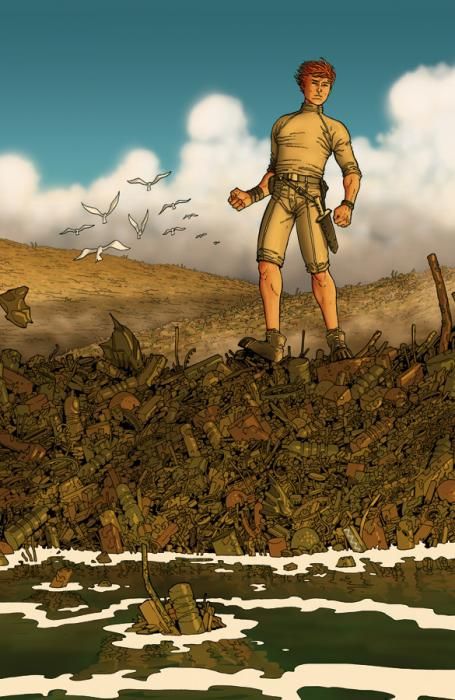"Great Pacific" #1 expands the hunt for unclaimed territories and new frontiers out into the Pacific Ocean as Chas Worthington tries to find a cause worthy of his ingenuity and interest. Joe Harris' story of a young billionaire seeking to do good with the inherited family fortune taken simply at plot level might seem dull, but Harris adds depth and complications to the story despite the lack of a truly compelling protagonist.
Granted, this is the first issue of a new series and therefore a new universe, but nothing in this issue gives me reason to pass judgment on Chas Worthington as either good or bad. He character simply functions as a plot device to help introduce a world through info dump. Harris introduces the reader to Worthington while the character is off with the Maasai, hunting a lion. Interesting setting, but nothing there to really feel. Harris perpetuates the rich kid stereotype and provides a scene of Worthington knocking golf balls off an oil rig before stopping in for dinner with his uncle in Texas. Yes, Harris pushes the story past that, trying to make Worthington a more compelling character, but there simply isn't enough room in "Great Pacific" #1 for that to happen.
The visuals on this book, while flashy, are not completely polished, although the technique is slightly hidden behind some of the flash. Martin Morazzo's characters are distinct enough and the story is well constructed, but the figures could use some refinement and the backgrounds could stand to be given some more attention and detail. One scene in particular, the porch scene between Chas and his uncle, has a solid foundation, but the perspective just needs to be tighter. Additionally, the lettering is non-traditional, but unimpressive, feeling like an experiment rather than a finished product.
After closing the issue, I took a moment to try to draw a comparison. The best I could concoct is that "Great Pacific" #1 is a combination of "Ferris Bueller's Day Off" with "Office Space" and some genericized Tom Clancy wannabe. There's more to this story that just some rich kid wanting to act out in a bold, dramatic way. It just needs some time to surface. All the same, the story has potential, especially as the Pacific Garbage Patch remains fictionalized in most of the general public's minds, giving Harris and Morazzo plenty of wiggle room to craft adventures. While comic books and graphic novels such as "Great Pacific" and Archaia's "I'm Not a Plastic Bag" might raise awareness of the problem, there's no denying it is a problem. The Great Pacific Garbage Patch is not going to go away if we ignore it, so it's best to start paying attention to the problem so we can figure out how to fix it. "Great Pacific" is not going to be a magic solvent, but it might provide some inspiration.

